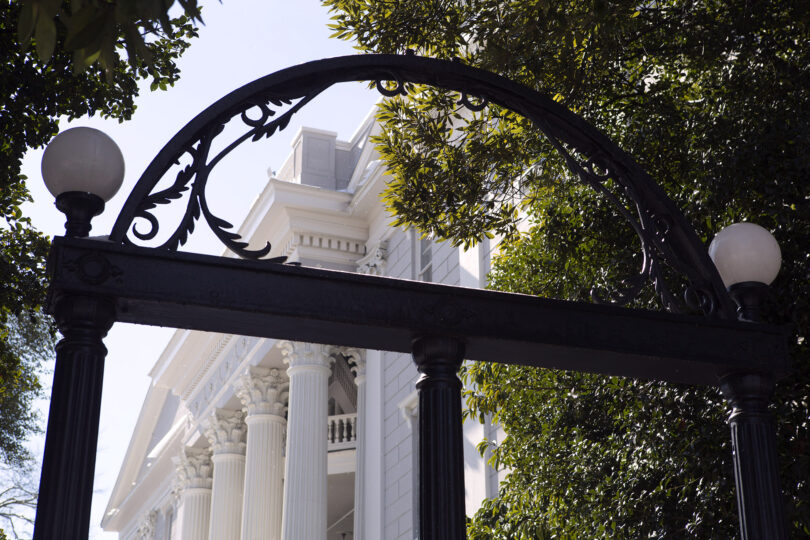Key measures advancing the University of Georgia were made official Thursday when Governor Brian P. Kemp signed into law the state’s fiscal year 2023 budget. With the budget’s approval, the University System of Georgia will apportion over $600 million to UGA in FY23.
“On behalf of the University of Georgia and the countless individuals and communities that we serve, I want to express my deepest thanks to the Governor, the General Assembly, the Chancellor and the Board of Regents,” said UGA President Jere W. Morehead. “Their strong investment in higher education will pay dividends for years to come as our university educates tomorrow’s leaders, drives discovery, and fosters economic and community development throughout Georgia.”
Funds provided in the FY23 budget will enable the University of Georgia to eliminate the Special Institutional Fee beginning this fall semester, saving UGA students $450 per semester. UGA also will maintain current tuition and fees for the 2022-2023 academic year, thanks to a Board of Regents vote earlier this year. This marks the third year in a row—and the fifth time in seven years—that the university has held tuition flat. UGA also has kept mandatory fees steady for three consecutive years.
Under the new budget, UGA faculty and staff who are full-time state employees will receive a $5,000 cost-of-living adjustment during the coming fiscal year, which begins July 1. An initial $5,000 cost-of-living adjustment was provided to full-time UGA employees in April through the amended FY22 budget.
“Recruiting and retaining outstanding faculty and staff is integral to the academic excellence that defines the University of Georgia,” said S. Jack Hu, the university’s senior vice president for academic affairs and provost. “The state’s investment in UGA is an investment in our vital missions of teaching, research and service.”
With investments in critical capital projects, the budget supports the university’s expanding research enterprise as well. In FY23, UGA will receive $37.1 million in construction funding for Phase I of the Science Hill modernization project, as well as $2.5 million for the design of the project’s second phase. The project aims to renovate 186,000 square feet of laboratory space in an area of campus known as Science Hill, providing flexible research and instructional areas for multiple STEM disciplines.
In addition to these allocations, the university anticipates receiving significant funding for Major Repair and Rehabilitation projects, which will update mechanical, electrical and plumbing systems in campus facilities while addressing safety and accessibility needs.
Several additional initiatives were funded through the amended FY22 budget, signed by Governor Kemp on March 16. The new Poultry Science Building received $3.2 million in equipment funding, while $3.9 million was appropriated for integrative precision agriculture, a university-wide initiative designed to bolster the state’s largest industry. In addition, $2 million was provided to restore and improve the Research Vessel Savannah, a crucial research tool for UGA’s Skidaway Institute of Oceanography.
The state’s investments in the University of Georgia come at a time when enrollment and numerous measures of academic excellence are at an all-time high. Last fall, UGA’s enrollment eclipsed 40,000 students for the first time. Applications for fall 2022 admission reached record levels, continuing several years of surging demand for a UGA degree. The university’s six-year and four-year completion rates also reached new highs, as did total R&D expenditures, sponsored research awards and measures of statewide economic impact.








